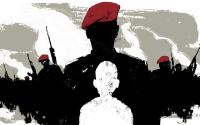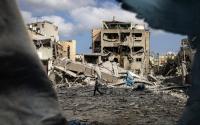Saddam will be the next US target, one way or another
The argument is now about how to take on Iraq
Friday November 16, 2001, The Guardian
Victory in war breeds new ambitions. In spite of the political disarray to which the military breakthrough has led in Afghanistan, the downcast mood of only 10 days ago in Washington has been replaced by a feeling of confidence. There is an expectation that the accelerating retreat of the Taliban will lead to their complete collapse, a hope that it will be followed by the capture or killing of Osama bin Laden and the rounding up of many of his followers, and a determination to begin at once the work of reconstructing Afghanistan. Such successes are hardly taken for granted, but they are sufficiently on the cards for the decision makers to raise their eyes beyond the Hindu Kush. And on that horizon looms Iraq.
European and Muslim anxieties about an American military descent on Iraq never really centred on the possibility of an immediate attack. The argument in Washington, as the Middle Eastern expert Judith Kipper puts it, was between those who wanted a binding commitment to an "Iraq next" strategy and those who thought such a commitment foolish. It could not have been kept secret, and would have undermined the task of building a coalition for Afghanistan. And it might have provoked moves by Saddam Hussein to which it would have been difficult to react effectively.
The officials who advised against an Iraq commitment include men and women who find it hard to conceive of any situation, short of incontrovertible evidence linking Saddam Hussein to the September 11 attacks, in which a military campaign against him would be a wise or necessary course. But they also include some whose objections were only tactical and short term. The Iraq argument is already reviving and, if Afghanistan continues to go well, it may soon be back at the centre of things.
Richard Perle, the most visible and forceful advocate of action against Iraq outside of government, believes that success in Afghanistan means that the US can move "from one liberation to another". The condemnation of the Afghan campaign as an assault on Islam and as a bombing of innocents will falter as the relief and gratitude of Afghans becomes evident. Iraq will then be seen in a new light, even by Arabs. By means not specified in detail but including arming and supporting opponents of the Iraqi regime, using US air power and with some limited commitment of Americans on the ground, he says, Saddam's fall could be encompassed.
Perle's reasons for urging this are that Saddam already has some capacity to wage chemical and biological war and "he is relentlessly pursuing nuclear weapons ... Once he gets them it's another ball game". In Perle's understanding Saddam is a man bent not only on survival but on revenge on America. Left alone, he will plot some calamity for America and its allies, as well as continuing to inflict suffering on his own people. Since the time for dealing with him relatively easily is already running out, Perle argues, the moment must be seized.
The group represented by Perle and Paul Wolfowitz, the US deputy defence secretary who is the most prominent hawk within the administration, are not alone in their preoccupation with Iraq. There is widespread agreement, among officials and among the public policy intellectuals in Washington think tanks that, after September 11, it is no longer possible to live with the "contained" Iraq of the past. Saddam either has to be removed or, at least, forced to genuinely comply with arms inspections again. As Ivo Daalder of the Brookings Institution says: "Iraq is next. The question is how."
That, of course, is an old question to which there has been no answer for a decade. But a school more optimistic and numerous than the Wolfowitz-Perle group believes that the September 11 attacks make it possible to isolate the Iraqi regime in a way which has not been possible for years. Russia, France and China who have in different ways offered a degree of support to Iraq, have changed their positions and could change them further. "We need to tell them that they have a choice over Iraq. Join us or stand aside," says Daalder. For some, the restoration of even a relatively weak arms inspection regime might be sufficient achievement for the time being.
Others hope that a reunited front against Iraq could conceivably bring about fundamental change without any necessity to use force from the outside. Professor Henri Barkey, a political scientist who follows America's Iraq policy, suggests that: "If you got all the big powers and all the regional countries together sending the message to Iraq that the top 100 people in the regime must go, you might be able to induce a change." In applying such pressure, he suggests, full use could be made of the fact that, with both America's allies and Iraq itself, people like Wolfowitz and Perle are waiting in the wings.
Barkey argues that change in Iraq is the key to a new relationship between the US and the Arab world above all because it would enable America to cease directly basing forces in Saudi Arabia, thus removing one of the principal grievances which help create the atmosphere in which violent Islamist movements grow.
It is a common view in Washington that joint action on Iraq should have been higher on the agenda for the Bush-Putin summit in Crawford, Texas, which ends today. "Iraq is much more important than NMD," said a former senior member of the National Security Council, "There is a tremendous opportunity to put this back in Putin's lap and say that Iraq is an equally grave threat to both of us." This argument takes ammunition from the final phase of the Kosovo war when the withdrawal of Russian support was a critical factor in the decision of the Milosevic regime to accept defeat.
The strong likelihood is that the diplomatic route to a new isolation of Iraq is the one that will be taken, rather than the military solution advocated by Perle and Wolfowitz. But neither precludes the other. The lobby for military action recognises the necessity for a period of diplomatic preparation, while some of those in the diplomacy school, more reluctantly, agree that there has to be a military last resort. The difficulty, however, is that the arguments for both courses are less than convincing.
A war against Iraq would be a hugely risky undertaking and one which, liberated Afghanistan or not, would set off a storm of protest in the Arab world. A proxy war that went wrong would either be another victory for Saddam or would have to be followed by a real invasion by American troops. On the other hand, although the safer diplomatic course might change Iraq's internal political dynamics, it might very well fail to do so. What then? Iraq, for all the changes brought by September 11, remains a problem where the desirable end is clear but the reliable means are lacking.






